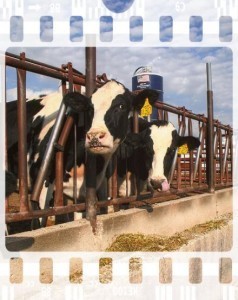Will Potter's Blog, page 19
May 29, 2013
North Carolina Law Would Make It Illegal to Expose Monsanto
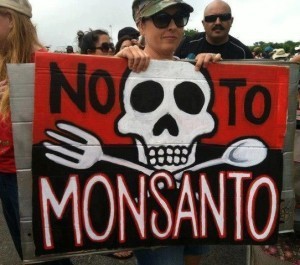 Two million people in 52 countries marched against Monsanto last week in protest of genetically-modified food and in support of consumer choice. There’s international pressure on this GMO giant like never before.
Two million people in 52 countries marched against Monsanto last week in protest of genetically-modified food and in support of consumer choice. There’s international pressure on this GMO giant like never before.
But proposed legislation in North Carolina would make it illegal for whistleblowers to expose how Monsanto and other corporations are threatening public health and the environment.
North Carolina’s SB 648 is appropriately named the “Commerce Protection Act.” The bill makes it illegal to obtain employment in order to “create or produce a record that reproduces an image or sound occurring within the employer’s facility, including a photographic, video, or audio” or “to capture or remove data, paper, records, or any other documents…”
It goes on to say that “any recording made or information obtained… shall be turned over to local law enforcement within 24 hours.”
The proposal is one of a dozen “ag-gag” bills that have been introduced across the country this year. Tennessee’s Governor Bill Haslam recently vetoed a similar proposal after a national outcry from groups like the Humane Society, ACLU, labor unions, the Sierra Club, and others.
“Ag-gag” laws not just about animal rights but #humanrights also owl.li/lnLkW @amnesty joins ag-gag opposition
— AmnestyInternational (@amnesty) May 24, 2013
Most recently Amnesty International called the bills an affront to human rights:
“What at first might appear to be exclusively an animal abuse issue is, on closer inspection, clearly also a freedom of expression issue, a workers’ rights issue, an environmental issue and a public health issue,” said Vienna Colucci, Director of Policy at Amnesty International USA. “And this is why such a diverse coalition has come together to oppose ‘ag-gag’ bills.”
And on top of that, the first ag-gag prosecution in the nation was a complete failure after it became a public relations disaster.
Not surprisingly, supporters of SB 648 in North Carolina are trying to run away from this failing trend, and say that the bill is not “ag-gag.” As I’ve discussed at length previously, that’s a complete lie. This bill has all the toxic provisions as other ag-gag proposals, and it was introduced on the same day Butterball workers pleaded guilty to animal cruelty after being exposed by undercover investigators.
The Chamber of Commerce issued a press release yesterday that said the bill is not ”ag-gag” because “an ag-gag bill focuses solely on the agriculture industry.”
On that point, the Chamber is absolutely correct. This bill is not limited to factory farms and slaughterhouses. It’s much worse than that. Just as Indiana’s ag-gag bill criminalized anyone who exposed fracking, this North Carolina bill is so broad that it includes all industries.
This is the evolution of “ag-gag.” These bills are not just about protecting Big Ag, they are about shielding all corporations from public accountability and oversight. And that’s a proposal that Monsanto and countless other corporations would love to see become law.
Join the 135,000 others who signed the petition at Change.org/AgGag!
May 15, 2013
Who Protects Farm Animals?
Congress is considering modest legislation that would set standards for egg laying hens, and standards for labeling eggs. That might seem like a no-brainer to anyone with the slightest concern for animal welfare or food safety, but the ag industry is in an uproar.
As Politico reported: “…powerful pork and beef cattle lobbies are up in arms, fearing the precedent, they say, of Congress dictating housing for livestock.”
In response, Iowa Rep. Steve King wants to repeal every voter-approved animal welfare reform that states have enacted. You read that correctly. As the Humane Society’s Wayne Pacelle notes, he wants to wipe out the reforms that voters have made law.
Meanwhile, the industry is trying to criminalize whistleblowers who expose animal welfare abuses. These “ag-gag” bills are intended to keep consumers in the dark, and punish those who expose abuses rather than those committing them.
This, in short, is the state of animal agriculture.
I sat down with NPR’s Doug Fabrizio to talk about industrial food production, and why Big Ag is fighting so hard to protect the most egregious cruelty on factory farms.
I was invited on the program, Radio West, because of my reporting on “ag-gag” bills and, specifically, the first ag-gag prosecution (in Utah). But our conversation also included a look at how whistleblowers and activists are being labeled as “terrorists,” and a broader discussion of whether an industry that kills 10 billion animals a year, and houses thousands of animals on a single farm, can ever be “humane.”
Listen to the interview below, or on the Radio West site.
May 14, 2013
New Laws Would Make Environmental Protest “Terrorism”
There’s a vibrant national protest movement reviving “direct action” tactics of civil disobedience. And groups like Cascadia Forest Defenders have been so effective that now lawmakers are calling them “terrorists” and trying to pass new laws criminalizing tree-sits.
The bills even single out the Elliott State Forest campaign by name and allow corporations to sue protesters for costing them money.
Just as the ag industry is trying to create a crime of “animal agriculture interference,” the forest industry is trying to create a crime of “interference with forestland management.”
My latest article for Vice investigates these bills and the resurgence of forest defense in the Pacific Northwest.
Here’s an excerpt:
“There’s been a 30-year reign of terror by these people having no respect for the rights of others,” says Rep. Wayne Krieger, a Republican. Krieger says “environmental terrorists” have been “chaining themselves to trees, locking themselves to equipment, and laying down in the road.”
Krieger, a tree farmer and former member of the Oregon Board of Forestry, has introduced HB 2995. It would create a new crime of “interference with state forestland management.” The first offense, a felony, carries a mandatory minimum sentence of 13 months; another offense kicks that up to a $25,000 fine and five years in prison. That’s five years for non-violent civil disobedience.
A companion bill, HB 2996, allows loggers to sue protesters for up to $10,000 in lost income up to six years after a protest ended.
Who are the environmentalists responsible for this terror?
“I coach kindergarten soccer,” says Jason Gonzales of Cascadia Forest Defenders. He testified against the bill and questioned lawmakers’ priorities. “We have students, we are professionals, we meet with governors, we present at panels. And when it’s the last resort we put our bodies on the line.”
Read the full story on Vice.com.
May 13, 2013
Let’s Make Tennessee’s Veto the Beginning of the End for #AgGag
Tennes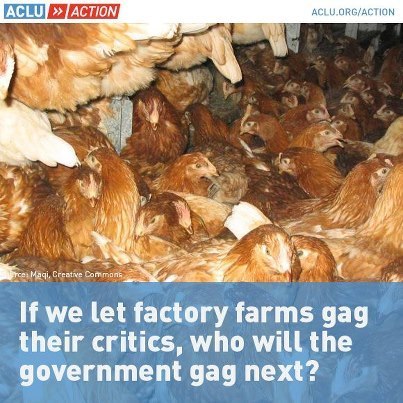 see Governor Bill Haslam has vetoed a bill that would punish whistleblowers who expose animal welfare, environmental, and workers’ rights abuses on factory farms and slaughterhouses. It’s a huge victory for Tennesseans, but it also has national significance. The tables have turned on Big Ag, and corporate front groups are desperately trying to pick up the pieces of the worst PR blunder in the industry’s history.
see Governor Bill Haslam has vetoed a bill that would punish whistleblowers who expose animal welfare, environmental, and workers’ rights abuses on factory farms and slaughterhouses. It’s a huge victory for Tennesseans, but it also has national significance. The tables have turned on Big Ag, and corporate front groups are desperately trying to pick up the pieces of the worst PR blunder in the industry’s history.
The governor’s office received more than 5,000 phone calls and 16,000 emails, nearly all of them opposing the bill. My petition on Change.org alone has more than 100,000 signatures opposing ag-gag.
The opposition in Tennessee came from clergy, the ACLU, unions, the Humane Society, whistleblower groups, prosecutors, environmental groups and more.
And let’s not forget this comes on the heels of the first ag-gag prosecution in the country. Just 24 hours after that story broke on this website, the prosecutor dropped all charges.
In short: Public awareness is absolutely toxic for this industry, and for ag-gag laws.
Gov. Haslam’s statement about his veto was brief but powerful. He said 1) a recent report by the attorney general that called the bill “constitutionally suspect,” 2) the bill violates the state shield law, which protects journalists, and 3) prosecutors say the bill would hinder animal cruelty investigations.
That’s a terse but damning indictment of not just the Tennessee bill, but ag-gag nationally. These bills can’t pass constitutional muster. They put animals, the environment, workers, and public safety at risk. And that message is getting out loud and clear to a very wide public coalition.
Thank you to everyone who has been following the issue on this website and making calls, sending emails, and signing petitions. Let’s build off this victory and hand the industry another embarrassing defeat, this time in North Carolina. The North Carolina bill is so broad that it’s not just “ag-gag.” It’s called the Commerce Protection Act and it applies the language and anti-consumer spirit of ag-gag to all of manufacturing.
Clearly other industries think that Big Ag is on to something, and want their own designer laws that would allow them to operate in secrecy, shielded from public opinion.
Something tells me they’re in for a surprise.
May 9, 2013
Tennessee Backlash Against “Ag-Gag” Law: “Maybe the cicadas will eat them.”
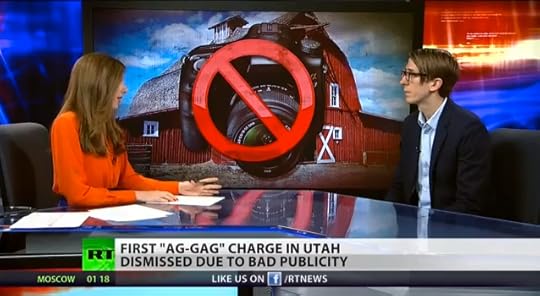 Tennessee Governor Bill Haslam has been inundated with calls and emails for him to veto “ag-gag” legislation that aims to silence whistleblowers who expose abuses on factory farms and slaughterhouses. He received more than 15 thousand emails. And of the 5 thousand phone calls, more than 90 percent urged a veto according to Nashville Public Radio.
Tennessee Governor Bill Haslam has been inundated with calls and emails for him to veto “ag-gag” legislation that aims to silence whistleblowers who expose abuses on factory farms and slaughterhouses. He received more than 15 thousand emails. And of the 5 thousand phone calls, more than 90 percent urged a veto according to Nashville Public Radio.
More than 33,000 people have signed an ACLU petition against the Tennessee bill.
More than 75,000 people have signed my Change.org petition against the bills, nationally.
More than 300 ministers and clergy have urged Governor Haslam to veto. “Genesis 1 tells us that everything on the earth has been created by God, and that God has commanded humans to care for the animals,” said Kathy Chambers, director of Clergy for Justice Tennessee. “Far too often they are subject to abuse which causes unthinkable suffering, clearly violating that mandate. As people of faith, we are called to speak out against injustice and cruelty in whatever forms they might take. Thus, we urge Governor Haslam to stand with people of faith across the state and veto this bill.”
[That description of undercover investigations is quite a bit different from the bill's sponsor, Rep. Andy Holt, who compared it to rape and sex trafficking.]
Even Pork Network has had to acknowledge the outcry: “From celebrities to clergy, politicians to consumers, all eyes are on Tennessee Governor Bill Haslam as he wrestles with signing or vetoing the state’s so-called ‘ag gag’ bill.”
Here’s a good example of how much these ag-gag efforts have backfired. I was asked to be on “Drake & Zeke,” which is the top-rated morning show in Memphis. To be honest I was a bit apprehensive about this, because I didn’t know if they’d be adversarial about the ag-gag bills. Boy was I wrong.
Listen to the full interview here.
An excerpt from Drake & Zeke:
“[Ag-gag] does put people like Gov. Bill Haslam in a real tough spot. Because he, being a Big Oil, understands how all that works now doesn’t he? So is he going to slap out at the Big Meat people? It’s dangerous and scary to see. But we’ll watch how the politicians let this one play out. Maybe the cicadas will eat them.”
Here’s another recent interview about ag-gag, about the first prosecution under one of these laws backfired:
May 1, 2013
Industry Tries to Hide “Ag-Gag” Efforts, Turns Away Journalists From #AAA13 Conference
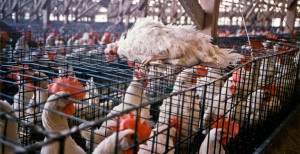 The agriculture industry is holding a conference right now about “ag-gag” laws, which criminalize anyone who exposes animal welfare abuses on factory farms and slaughterhouses. In response to the massive public backlash against the bills, the industry is now trying to keep journalists and attorneys away from its conference.
The agriculture industry is holding a conference right now about “ag-gag” laws, which criminalize anyone who exposes animal welfare abuses on factory farms and slaughterhouses. In response to the massive public backlash against the bills, the industry is now trying to keep journalists and attorneys away from its conference.
The conference is ominously called “Activists at the Door: Protecting Animals, Farms, Food & Consumer Confidence.” It’s hosted by the Animal Agriculture Alliance today and tomorrow in Arlington, Virginia.
The ag alliance invited media to register for the conference months ago. I took them up on that offer, and sent in my press credentials and asked to be registered.
They promptly denied me.
“The fact is you don’t have the right to know where your food came from.”
– Joe Miller, Rose Acre Farms, at AAA13
Emily Meredith, the communications director, wrote back that “The Alliance Summit is specifically for Alliance members, donors and other invited stakeholders affiliated with the Alliance.” (That’s a lie, as you can see here in their email asking media to register).
It turns out the alliance is also turning away attorneys, including Nicole Roth, who is on the board of directors of the Animal Legal Defense Fund. The ag alliance’s response to Roth was even more candid: “…we reserve the right to deny registration to anyone who we feel will not aid our organization and industry stakeholders…”
As the Animal Legal Defense Fund reports:
Why else would an attorney, mom of two, with no criminal record or history of civil disobedience be denied access? Maybe it is because I am on the Board of Directors of the Animal Legal Defense Fund. Not only is the AAA prohibiting law abiding citizens like myself access to the conference, the AAA has also denied press passes to reporters known to critique their practices. Reporter Will Potter, author of Green Is The New Red, was similarly denied access.
It would seem that the AAA is going to some length to ensure that people with strong voices on one side of the issue are not in the room for their conferences. That might make sense if the AAA’s agenda is to protect the businesses and profits of the agriculture industry. If they want to protect consumers, food, and animals, as they claim, then sharing information and having an intelligent debate would better serve their interests.
That’s what this is all about: protecting corporate profits by keeping consumers in the dark. The ag industry has reason to fear public attention. Just look at what happened yesterday: just 24 hours after I broke a story about the first ag-gag arrest in the country and it went viral, prosecutors had dropped all charges. Right now, Tennessee Governor Bill Haslam is considering a veto of new ag-gag legislation.
The Animal Agriculture Alliance says this conference will provide “expert advice” on ag-gag legislation, and handling undercover investigations. Here’s some better advice for corporate attendees: stop trying to hide.
UPDATE: Looks like someone has a video feed:
#AAA13 attendees upset public can watch their conference ihigh.com/alltech/broadc… Perhaps they want #aggagrestrictions for conference too?
— Ashley Rhinehart (@ARhinehart1) May 1, 2013
April 30, 2013
Amy Meyer’s Ag-Gag Charges Have Been Dropped!
 GOOD NEWS! Just 24 hours after I broke the story about Amy Meyer’s arrest under Utah’s ag-gag bill, the Draper City prosecutor’s office has dropped all charges!
GOOD NEWS! Just 24 hours after I broke the story about Amy Meyer’s arrest under Utah’s ag-gag bill, the Draper City prosecutor’s office has dropped all charges!
The charges were dismissed without prejudice, which means there’s a possibility of them being filed again, but her attorney says this is highly, highly unlikely — especially after the massive outpouring of outraged after yesterday’s article. To give you an idea: the article made it on the front page of reddit.com today, and in a few hours hundreds of thousands of people visited this website (crashing it for about an hour as we scrambled to adjust the servers).
Meyer and her attorney have bombarded with media calls. The Salt Lake Tribune ran a story based on my article today, as did Democracy Now. Local reporters even came to her home, attempting to follow up on this story.
I’ll post more later, but in short: thank you all for generating so much attention to this injustice. It’s not often that we can celebrate “good news” on this website, but today is certainly one of them. The first use of any ag-gag law in the country, the very first prosecution, has been a resounding failure.
I really hope this serves as a warning. Not to activists, but to Big Ag: you are losing.
April 29, 2013
First “Ag-Gag” Prosecution: Utah Woman Filmed a Slaughterhouse from the Public Street
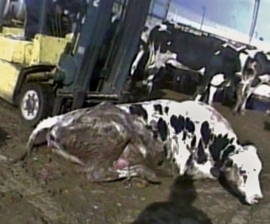
In a different case, video footage of downer cows moved by heavy machinery led to the largest meat recall in history.
UPDATE: Just 24 hours after I broke this story here, and following a massive amount of media coverage, prosecutors dropped all charges!
Amy Meyer wanted to see the slaughterhouse for herself. She had heard that anyone passing by could view the animals, so she drove to Dale Smith Meatpacking Company in Draper City, Utah, and from the side of the road she could see through the barbed-wire fence. Piles of horns littered the property. Cows struggled with workers who tried to lead them into a building. And one scene in particular made her stop.
“A live cow who appeared to be sick or injured being carried away from the building in a tractor,” Meyer told me, “as though she were nothing more than rubble.”
As she witnessed this, Meyer did what most of us would in the age of smart phones and YouTube: she recorded.
When the slaughterhouse manager came outside and told her to stop, she replied that she was on the public easement and had the right to film. When police arrived, she said told them the same thing. According to the police report, the manager said she was trespassing and crossed over the barbed-wire fence, but the officer noted “there was no damage to the fence in my observation.”
Nebraska, North Carolina, Pennsylvania, Tennessee, and Vermont are all considering similar bills right now.
Meyer was allowed to leave. She later found out she was being prosecuted under the state’s new “ag-gag” law.
This is the first prosecution in the country under one of these laws, which are designed to silence undercover investigators who expose animal welfare abuses on factory farms. The legislation is a direct response to a series of shocking investigations by groups like the Humane Society, Mercy for Animals, and Compassion Over Killing that have led to plant closures, public outrage, and criminal charges against workers.
Even the most sweeping ag-gag bills, such as the American Legislative Exchange Council model legislation, don’t explicitly target filming from a roadside. But Nebraska, North Carolina, Pennsylvania, Tennessee, and Vermont are all considering bills similar to the Utah law right now.
Pennsylvania’s bill criminalizes anyone who “records an image of, or sound from, the agricultural operation” or who “uploads, downloads, transfers or otherwise sends” the footage using the Internet.

Images of the plant and cows going to slaughter are available at the Dale Smith website.
North Carolina’s bill doesn’t specifically mention factory farms or slaughterhouses: it is called the “Commerce Protection Act,” and it includes investigations of any industry. It was introduced on the same day a fifth employee of Butterball pleaded guilty to animal cruelty after an undercover investigation showed workers beating turkeys.
Tennessee’s bill has already passed and is awaiting signature from the governor. In response to calls for a veto from the Humane Society and Carrie Underwood, one state representative compared undercover investigations to rape and sex-trafficking.
California’s ag-gag bill recently failed, after a massive public backlash. One newspaper editorial said “the cattlemen have committed the worst PR gaffe since New Coke.” The bill was a response to an undercover investigation by the Humane Society that showed “downer” cows, too sick to move, being pushed by tractors (much like what Amy Meyer recorded in Utah). It led to the largest meat recall in U.S. history.
The public backlash against these bills, including recent editorials by the New York Times and Washington Post, has relied on hypothetical examples of how they could be used. The AFL-CIO and Teamsters say they could put workers at risk. The ASPCA says they could shut down lawful investigations by animal protection groups. The National Press Photographers Association says they could wrap up journalists.
The first ag-gag prosecution should be a warning that these aren’t hypothetical concerns. These bills have one purpose: keep consumers in the dark. Rather than respond to video footage of animal cruelty with across-the-board reforms, the industry is trying to turn off the cameras.
“These aren’t hypothetical concerns… the industry is trying to turn off the cameras.”
It’s telling that the owner of the slaughterhouse Amy Meyer filmed happens to be Darrell H. Smith, the town mayor. (Mayor Smith, the meatpacking company, and the local prosecutor did not return phone calls for comment). If that’s shocking to you, it shouldn’t be. In Iowa, for example, the nation’s first ag-gag law was sponsored by Rep. Annette Sweeney, who is the former director of the Iowa Angus Association.
In Utah, the bill’s sponsor, Rep. John Mathis, called undercover investigators “animal rights terrorists” and said video recordings of animal abuse are “propaganda.” In his opening remarks at a legislative hearing on the ag-gag bill, Mathis said: “It’s fun to see my good ag friends in this committee… all my good friends are here.” Ag-gag supporters couldn’t be any more transparent in their financial motivations for censorship.
It was prescient that, as the Utah bill was being considered, the Utah Sentencing Commission warned that it could be used against anyone who merely takes a photograph of a farm or slaughterhouse. At the time, Rep. Greg Hughes of Draper replied: “Who would really pursue that in terms of prosecution?” Now, the first ag-gag prosecution is for precisely that, in his own district.
Most people won’t ever find themselves in the position of Amy Meyer, of course. Few of us actively seek out information about how our food is produced. (Do you know the location of a factory farm, if you wanted to?) The animal products just arrive at the supermarket, without investigation or thought.
“Who would really pursue that in terms of prosecution?”
With ag-gag bills, the industry is trying to keep it that way. These bills are not just about animal activists from national organizations going undercover. They are about people like Amy Meyer, who have seen how animals are being treated, and who want you to see what they have seen.
Most importantly, ag-gag bills are about you — the millions of Americans who might see this footage, be sickened by it, and demand a change.
Will Potter is the author of Green Is the New Red: An Insider’s Account of a Social Movement Under Siege (City Lights, 2011).
Concerned about ag-gag laws? Join the 40,000+ others who have signed the petition at Change.org/AgGag
First “Ag-Gag” Prosecution: This Utah Woman Filmed a Slaughterhouse from the Public Street

In a different case, video footage of downer cows moved by heavy machinery led to the largest meat recall in history.
Amy Meyer wanted to see the slaughterhouse for herself. She had heard that anyone passing by could view the animals, so she drove to Dale Smith Meatpacking Company in Draper City, Utah, and from the side of the road she could see through the barbed-wire fence. Piles of horns littered the property. Cows struggled with workers who tried to lead them into a building. And one scene in particular made her stop.
“A live cow who appeared to be sick or injured being carried away from the building in a tractor,” Meyer told me, “as though she were nothing more than rubble.”
As she witnessed this, Meyer did what most of us would in the age of smart phones and YouTube: she recorded.
When the slaughterhouse manager came outside and told her to stop, she replied that she was on the public easement and had the right to film. When police arrived, she said told them the same thing. According to the police report, the manager said she was trespassing and crossed over the barbed-wire fence, but the officer noted “there was no damage to the fence in my observation.”
Nebraska, North Carolina, Pennsylvania, Tennessee, and Vermont are all considering similar bills right now.
Meyer was allowed to leave. She later found out she was being prosecuted under the state’s new “ag-gag” law.
This is the first prosecution in the country under one of these laws, which are designed to silence undercover investigators who expose animal welfare abuses on factory farms. The legislation is a direct response to a series of shocking investigations by groups like the Humane Society, Mercy for Animals, and Compassion Over Killing that have led to plant closures, public outrage, and criminal charges against workers.
Even the most sweeping ag-gag bills, such as the American Legislative Exchange Council model legislation, don’t explicitly target filming from a roadside. But Nebraska, North Carolina, Pennsylvania, Tennessee, and Vermont are all considering bills similar to the Utah law right now.
Pennsylvania’s bill criminalizes anyone who “records an image of, or sound from, the agricultural operation” or who “uploads, downloads, transfers or otherwise sends” the footage using the Internet.

Images of the plant and cows going to slaughter are available at the Dale Smith website.
North Carolina’s bill doesn’t specifically mention factory farms or slaughterhouses: it is called the “Commerce Protection Act,” and it includes investigations of any industry. It was introduced on the same day a fifth employee of Butterball pleaded guilty to animal cruelty after an undercover investigation showed workers beating turkeys.
Tennessee’s bill has already passed and is awaiting signature from the governor. In response to calls for a veto from the Humane Society and Carrie Underwood, one state representative compared undercover investigations to rape and sex-trafficking.
California’s ag-gag bill recently failed, after a massive public backlash. One newspaper editorial said “the cattlemen have committed the worst PR gaffe since New Coke.” The bill was a response to an undercover investigation by the Humane Society that showed “downer” cows, too sick to move, being pushed by tractors (much like what Amy Meyer recorded in Utah). It led to the largest meat recall in U.S. history.
The public backlash against these bills, including recent editorials by the New York Times and Washington Post, has relied on hypothetical examples of how they could be used. The AFL-CIO and Teamsters say they could put workers at risk. The ASPCA says they could shut down lawful investigations by animal protection groups. The National Press Photographers Association says they could wrap up journalists.
The first ag-gag prosecution should be a warning that these aren’t hypothetical concerns. These bills have one purpose: keep consumers in the dark. Rather than respond to video footage of animal cruelty with across-the-board reforms, the industry is trying to turn off the cameras.
“These aren’t hypothetical concerns… the industry is trying to turn off the cameras.”
It’s telling that the owner of the slaughterhouse Amy Meyer filmed happens to be Darrell H. Smith, the town mayor. (Mayor Smith, the meatpacking company, and the local prosecutor did not return phone calls for comment). If that’s shocking to you, it shouldn’t be. In Iowa, for example, the nation’s first ag-gag law was sponsored by Rep. Annette Sweeney, who is the former director of the Iowa Angus Association.
In Utah, the bill’s sponsor, Rep. John Mathis, called undercover investigators “animal rights terrorists” and said video recordings of animal abuse are “propaganda.” In his opening remarks at a legislative hearing on the ag-gag bill, Mathis said: “It’s fun to see my good ag friends in this committee… all my good friends are here.” Ag-gag supporters couldn’t be any more transparent in their financial motivations for censorship.
It was prescient that, as the Utah bill was being considered, the Utah Sentencing Commission warned that it could be used against anyone who merely takes a photograph of a farm or slaughterhouse. At the time, Rep. Greg Hughes of Draper replied: “Who would really pursue that in terms of prosecution?” Now, the first ag-gag prosecution is for precisely that, in his own district.
Most people won’t ever find themselves in the position of Amy Meyer, of course. Few of us actively seek out information about how our food is produced. (Do you know the location of a factory farm, if you wanted to?) The animal products just arrive at the supermarket, without investigation or thought.
“Who would really pursue that in terms of prosecution?”
With ag-gag bills, the industry is trying to keep it that way. These bills are not just about animal activists from national organizations going undercover. They are about people like Amy Meyer, who have seen how animals are being treated, and who want you to see what they have seen.
Most importantly, ag-gag bills are about you — the millions of Americans who might see this footage, be sickened by it, and demand a change.
Will Potter is the author of Green Is the New Red: An Insider’s Account of a Social Movement Under Siege (City Lights, 2011).
Concerned about ag-gag laws? Join the 40,000+ others who have signed the petition at Change.org/AgGag
Excellent Illustrated Series on Grist: Big Ag Fights to Keep Out Troubled Eyes
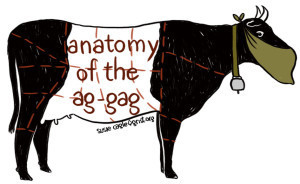 If you’re not already following Susie Cagle’s reporting over at Grist, you should be. Like — now. She has a fantastic new series of articles investigating ag-gag bills. They combine Cagle’s reporting and interviews with her talent for illustrations. There’s also an interactive map about ag-gag laws, and a fun flow chart.
If you’re not already following Susie Cagle’s reporting over at Grist, you should be. Like — now. She has a fantastic new series of articles investigating ag-gag bills. They combine Cagle’s reporting and interviews with her talent for illustrations. There’s also an interactive map about ag-gag laws, and a fun flow chart.
Here’s an excerpt from “A gag too far”:
There’s no way these bills are going to stand up to public scrutiny or legal challenges. And in the meantime, I think all movements seem to be responding very forcefully rather than being afraid of this,” says Potter.
“Ag-gag bills have already backfired in terms of the massive outcry of public opposition. And if they go through I think they’ll also backfire in motivating people to do undercover investigations on their own, motivating people to get active in a wide variety of ways, and really invigorating a movement that feels like they’re being censored.”
With so many ag-gags defeated in recent years, activists have reason to be optimistic. But even in some states that have defeated ag-gags, the bills keep returning for another shot. In rallying the opposition, these bills may be the biggest thing to happen to the animal protection movement in recent memory, but they may also prove to be the movement’s biggest test.
Here’s the full series at Grist:
Troubled slaughter: Big Ag fights to keep out prying eyes
The state(s) of the ag-gag
Two views on ag-gags: The investigator and the farm advocate
So you want to document farm abuses?

